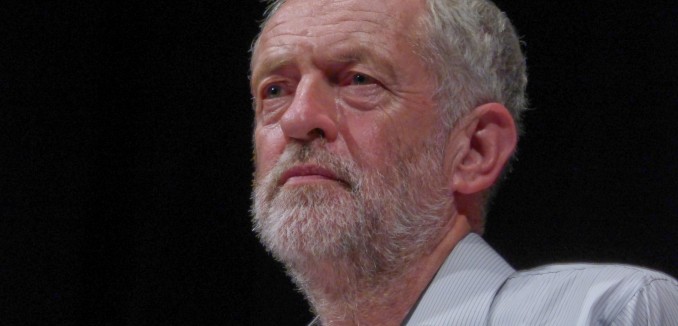There is now a serious possibility that Jeremy Corbyn, the controversial leader of the British Labour Party, could be deposed over the anti-Semitism scandal engulfing his party. Several Labour frontbenchers are reportedly threatening to resign in protest, and there is talk of a possible coup. The scandal is so toxic that Corbyn has reportedly been disinvited from campaigning for his own party in Wales for this week’s local elections.
If Corbyn falls over the anti-Semitism scandal, British Jews should prepare for an ugly backlash from the country’s far Left. As it stands, Corbyn and his allies in the Labour leadership are spinning the crisis as a malicious bid to undermine the Left. Should the crisis claim Corbyn’s scalp, the hard Left would plausibly seek to martyr him as a victim of a sinister Jewish (or rather, Zionist) conspiracy. His downfall over “false” allegations of anti-Semitism would be taken to confirm the power of that legendary lobby.
Jewish and Israeli figures have already waded into this debate quite publicly. Israel’s new ambassador to the UK, Mark Regev, attacked Corbyn directly on the BBC. “Some progressive politicians have embraced Hamas,” Regev told Andrew Marr, in an unmistakable reference to Corbyn, who has previously called Hamas and Hezbollah “friends.” He demanded an “unequivocal message” from the Labour leadership that “there is no solidarity with anti-Semites.” Simultaneously, Labour’s major Jewish donors have been abandoning the party over Corbyn’s leadership. According to former donor Michael Foster, one-third of the £9.7 million of private donations to Labour in the run-up to the 2015 election came from Jewish donors: the disappearance of this money will be a serious blow. If Corbyn’s downfall is blamed on a combination of Israeli meddling and Jewish money, rather than seen as a consequence of his complicity in a genuine problem, this could prove a watermark in the development of left-wing anti-Semitism.
Indeed, Corbyn and his allies are already spinning the current crisis as a fabrication—and it is not difficult to imagine by whom. “It’s not a crisis, there is no crisis,” Corbyn vowed recently. “I suspect that much of this criticism…actually comes from those who are nervous of the strength of the Labour Party at a local level.” Ken Livingstone, the former London mayor who ignited the furor with his contention that “Hitler supported Zionism,” blamed the entire scandal on “embittered old Blairite MPs.” Trade union chief Len McCluskey dubbed the row a “cynical attempt” to challenge Corbyn’s leadership. “It is a smear to say that the Labour Party has a problem with anti-Semitism,” concurred Diane Abbott, the shadow international development minister, on the BBC.
Not only is the crisis supposedly fabricated, in the mind of much of the Left: anti-Semitism is too. The “Livingstone Formulation,” named for Ken Livingstone years ago, describes how allegations of anti-Semitism are often met with a counter-accusations of dishonesty and bad faith on the part of the accusers. In the context of modern thought on the Left, in which the world is viewed through hierarchies of oppression and—in a historical U-turn—places Jews within the “white” and “privileged” end of the matrix, the logical conclusion is that anti-Semitism is a Jewish conspiracy in itself: an attempt by a powerful group to advance its predatory interests through inventing allegations of victimhood.
Therein lies the tragic irony of the fight against modern anti-Semitism. Like the fabled hydra, it is liable to regenerate when attacked, because all resistance to it appears to vindicate the conspiratorial mindset: that regressive forces are attempting to thwart the inexorable march to progress by framing the Left. And therein lies the cruel paradox: when politicians make outrageous statements demonizing the Jewish state, Israel and the Diaspora Jewish public are placed in an impossible situation. If they do not react, they leave anti-Semitism to grow without a challenge; but if they do, as they are reasonably expected to do, they risk letting anti-Semitism grow because of the challenge.
Should Corbyn be deposed, one can expect to hear that his left-wing agenda was foiled by a Jewish (or Zionist) plot in collaboration with a right-wing press to protect Israeli and capitalist interests. Indeed, should he remain in power, this episode can still be spun as such a plot, albeit a failed one. How far this narrative catches on will depend on how Corbyn’s successor rationalizes his defeat. Whoever takes over will have an interest in wiping a clean state, but given Corbyn’s resounding victory in the Labour primaries in 2015, the next leader will likely come from the same camp and thus be affiliated with the same circles at the heart of the current crisis. Unless the next leader, in the eventuality that Corbyn departs, is able to cleanse the Augean stables, new Jewish conspiracies are likely to grow in that muck. Jews in Britain must be prepared to challenge this toxic narrative and ensure that it not be canonized in popular memory of this surreal scandal.
Eylon Aslan-Levy is a British-Israeli political commentator and writer. He is a graduate of Oxford and Cambridge, and a veteran lone soldier in the IDF. Twitter: @EylonALevy
For more on Corbyn and the rise of anti-Semitism in the Labour Party, read Western Europe’s Most Powerful Anti-Zionist, published in The Tower Magazine just after Corbyn rose to power in September 2015.
[Photo: Steve Eason / flickr]




